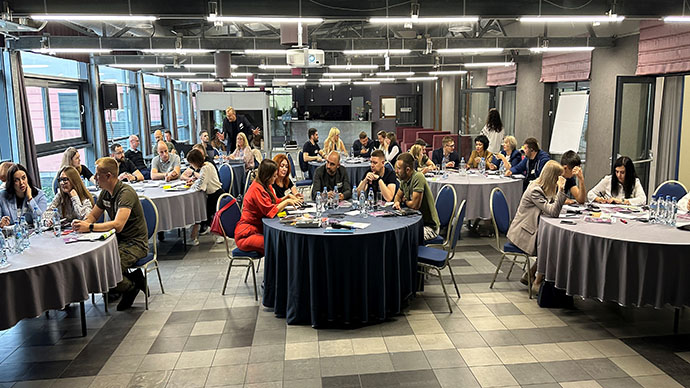Strategically using evidence to advance the investigation when interviewing suspects, witnesses and victims, and securing the evidence in a legal and human rights compliant manner, are some of the themes brought up with prosecutors and investigators from Ukraine during our three-day workshop in Krakow this week.
The Norwegian Center for Human Rights (NCHR), the Norwegian Police University College and the National Criminal Service (KRIPOS), have teamed up with colleagues from The Greater Manchester Police Counter Terrorism Unit, the Metropolitan Police Counter Terrorism Command’s War Crimes Unit (UK), the Ukrainian NGO Just Group and the Ukrainian General Prosecutor's Office for the joint training exercise.
Crime or war crime?
In the case of the murdered security guards, the Ukrainian police need to collect the evidence in a way that will stand the test of trial, and be in line with international human rights standards. The Ukrainian police can expect resistance from the interviewee. What other evidence than CCTV may connect the suspect to the crime? Considering how to interview and establish rapport with a suspect is important. Provided the suspects are willing to speak at all, how do you deal with their reluctance to disclose information? Such decision-making involved in investigations and interviews are complex topics.
Within the context of the war in Ukraine, local authorities have the added challenge of distinguishing between crimes and war crimes. Their caseload is growing exponentially and challenges with coordination are growing, in parallel with the increasing international engagement in the country.
Ukrainian authorities must remain in the driving seat during key reform processes. A key task for the international community is to help ensure that in the best possible way. The training programme on “investigative interviewing” has considered the risks of, and is avoiding, inundating the domestic criminal justice system with technical and legal criminal justice assistance projects that do not correspond with their needs or systems.

Compatibility in knowledge, methods, skills and values
“After months of online interaction and training, we are all pleased to finally work face to face. And what a a week we have had together. The Ukrainian/UK/Norwegian team demonstrated what compatibility in knowledge, methods, skills and values can do for joint professional development”, says Gisle Kvanvig, from the Norwegian Centre for Human Rights.
Together we covered the wider investigative interviewing universe starting with the PEACE model, used the CTI manual and UNODC e-learning on investigative interviewing for practical guidance, and discussed the normative foundations as expressed in the Mendez principles. We explored cognitive interviewing, how to understand and handle trauma and vulnerability, touched upon the ORBIT model, and worked on cases relating to war crimes, interviewing children and corruption.
A massive thanks to British colleagues from the Greater Manchester Police Counter Terrorism Department and the Metropolitan Police Counter Terrorism Command’s (SO15) War Crimes Unit for sharing their people, expertise and professionalism. As always, NCHR relies heavily on our cooperation with the Police University College and KRIPOS. We are grateful to both for their continued support, expertise and resources.
The research and professional development in the UK continues to inspire. Thank you to Just Group for making the training possible, and the Ukrainian General Prosecutor's Office and the Ukrainian police detectives for training with us and teaching us about the current challenges they face.
We look forward to continuing the cooperation.
The NCHR cooperation with Ukrainian authorities is supported through the Norwegian government’s Nansen Support Programme for Ukraine.
